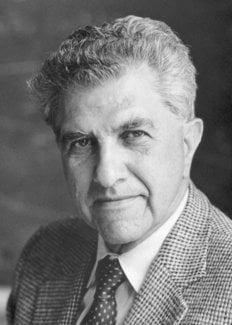Merton H. Miller
Biographical

I was born in Boston, Massachusetts on May 16, 1923, the only child of Joel and Sylvia Miller. My father, an attorney, was a graduate of Harvard University (A.B. 1916) and in that one respect, at least, I followed in his footsteps, entering Harvard in 1940 and graduating in 1943 (A.B., magna cum laude, Class of 1944). My main interest, however, was in economics, not law. One of my college classmates – indeed we were in the same section of the introductory survey course, Economics A – was Robert M. Solow, the laureate in Economics for 1987.
During the war years I worked as an economist first in the Division of Tax Research of the U.S. Treasury Department and subsequently in the Division of Research and Statistics of the Board of Governors of the Federal Reserve System. In 1949, I decided to return to graduate school and chose Johns Hopkins University in Baltimore primarily because Fritz Machlup was then a leading member of its small, but very distinguished faculty.
My first academic appointment after receiving my doctorate from Hopkins in 1952 was Visiting Assistant Lecturer at the London School of Economics for 1952-1953. From there I went to Carnegie Institute of Technology (now Carnegie-Mellon University) whose Graduate School of Industrial Administration was the first and most influential of the new wave of research-oriented U.S. business schools. Among my colleagues at Carnegie were Herbert Simon (Economics Laureate 1978) and Franco Modigliani (Economics Laureate 1985). Modigliani and I published the first of our joint M&M papers on corporation finance in 1958 and we collaborated on several subsequent ones until well into the mid-1960’s.
In 1961, I left Carnegie for the Graduate School of Business at the University of Chicago where I have been ever since except for a one-year visiting professorship at the University of Louvain in Belgium during 1966-1967. At Chicago, where I am currently Robert R. McCormick Distinguished Service Professor, most of my work continued to be focussed on corporate finance until the early 1980’s when I became a public director of the Chicago Board of Trade. My research interests since then have shifted strongly towards the economic and regulatory problems of the financial services industry, and especially of the securities and options exchanges. I am currently serving as a public director of the Chicago Mercantile Exchange where I had served earlier as Chairman of its special academic panel to conduct the post-mortem on the Crash of October 19-20, 1987.
I continue to be an activist supporter of free-market solutions to economic problems, very much in the tradition of my fellow Chicago laureates, Milton Friedman (1976), Theodore Schultz (1979) and George Stigler (1982).
The untimely death in 1969 of my first wife, Eleanor, the mother of my then 3 young daughters, was a heavy personal blow. I have since remarried and my wife Katherine and I divide our time between a Hyde Park townhouse during the week, and a country retreat on a working farm (though not worked by us) in Woodstock, Illinois on the weekends. Like some other weekend retreaters my hobby has become brush-cutting and maintenance generally, plus a little gardening. Unlike some of my more athletic fellow laureates, however, the closest I get to recreational exercise these days is watching the Chicago Bears from my season-ticket seats (17 years now) in the south-end zone of frigid Soldier Field.
This autobiography/biography was written at the time of the award and later published in the book series Les Prix Nobel/ Nobel Lectures/The Nobel Prizes. The information is sometimes updated with an addendum submitted by the Laureate.
Merton H. Miller died on June 3, 2000.
Nobel Prizes and laureates
Six prizes were awarded for achievements that have conferred the greatest benefit to humankind. The 12 laureates' work and discoveries range from proteins' structures and machine learning to fighting for a world free of nuclear weapons.
See them all presented here.
